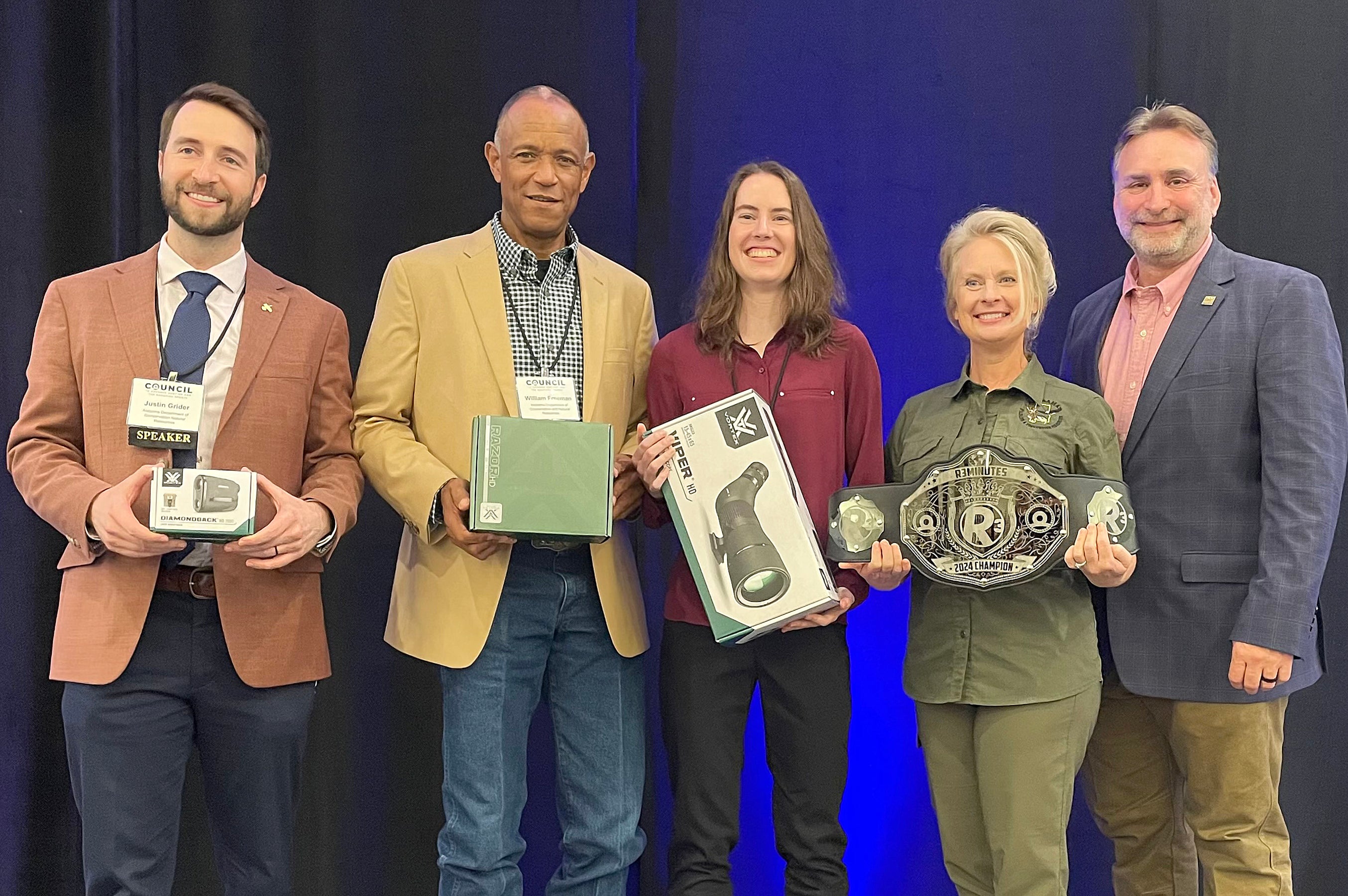By DAVID RAINER, Alabama Department of Conservation and Natural Resources
Outdoors professionals from around the country converged on Mobile and Riverview Plaza last week to brainstorm on recruitment, retention and reactivation (R3) of hunters, anglers and other outdoors enthusiasts.
The 210 National R3 Symposium attendees from all over the U.S., as well as New Zealand and Guam, heard reports on hunting and fishing participation numbers, youth shooting sports, new R3 strategies, demographics of those who enjoy the outdoors, an increase in female participation, and shooting ranges, to name just a few.
The Symposium also received a “Welcome to Alabama” by Chris Blankenship, Commissioner of the Alabama Department of Conservation and Natural Resources (ADCNR), who asked for a show of hands from the people who were visiting Alabama for the first time.
“It’s great to see people from around the country in Alabama, not only for the beauty and the outdoors recreational opportunities, but also to share all the great things we’re doing with the Department, especially on the recruiting front to get more people to hunt, fish and enjoy the outdoors in Alabama,” Commissioner Blankenship said. “Hopefully, here at the Symposium, people can pick up a few things from us and we can pick up a few things from them and get more people into the outdoors.
“I’m blessed to be able to work for a governor (Kay Ivey) who is proactive and with fellow cabinet members who are doing a lot of good things around the state. In Mobile, the mayor (Sandy Stimpson) is doing a fantastic job with bringing in industry and making good changes in coastal Alabama. If you look out your hotel rooms, they’re building ships right across the river at Austal Shipbuilding. They’re building ships for the (U.S.) Navy – littoral combat ships and expeditionary vessels in downtown Mobile. Airbus is located in Mobile, building A321 and A220 aircraft.”
Commissioner Blankenship highlighted other economic milestones in Alabama. Airbus is finishing another final assembly line and will make Mobile the fourth largest airline manufacturing location in the world. Alabama is also fifth in the nation in automobile manufacturing with Mercedes-Benz, Toyota/Mazda, Hyundai and Honda facilities.
He said the Port of Mobile is the 10th largest port in the nation, and work being done now could move it up the list.
“We’re in the process of deepening and widening the ship channel so we will have the deepest ship channel on the Gulf of Mexico to increase the capacity through the port,” said Commissioner Blankenship, who also pointed out that Mayor Stimpson is moving the Mobile Airport from west Mobile to Brookley Field in downtown Mobile.
“I am excited to be the Commissioner of the Department of Conservation and Natural Resources in a state where we are blessed with diversity from one end of the state to the other,” he said. “Outdoor recreation has a $14 billion impact in our state with 135,000 jobs. That is really important to us. We’re using outdoor recreation to recruit people, a different type of R3, to hunt, fish and shoot. We have 21 State Parks with 6 million visitors annually. We have about $200 million in State Parks improvements underway right now. In the history of Alabama, I don’t know if we’ve ever spent $200 million on State Parks.”
Commissioner Blankenship also pointed out that Alabama currently has 46 wildlife management areas (WMAs) with about 800,000 acres under ADCNR management. The state has 12 shooting ranges with an additional one in the works in Shelby County. Alabama leads the nation in archery parks with 20 and two more on the way as well as 23 public fishing lakes that provide outdoor recreation and subsistence fishing in rural areas.
“We’re also spending about $30 million across the state to improve boating access,” he said. “One of the initiatives of the Governor and I is to improve outdoor access through boating access and land acquisition for more hunting and public recreation opportunities.
“Alabama also has the largest artificial reef area off our coast. I know some of you are planning to catch red snapper this weekend. We have the largest reef system and best red snapper fishery anywhere in the world. I was at a conference several years ago with the Fisheries Minister for the country of Japan. He and I were discussing who had the largest reef system. I speak no Japanese and he spoke very little English. I’m going to say that I won the argument.”
Commissioner Blankenship highlighted the Forever Wild Land Trust, which uses $15 million in funding annually to buy land for public access. To date, the program has purchased more than 200 tracts of land that total right at 300,000 acres.
“As Commissioner, I am chair of the Forever Wild Board, and I think that may be my favorite thing I get to do because we take a depleting resource – oil and gas revenues – and we’re turning that into buying property that will belong to the people of Alabama forever,” he said.








